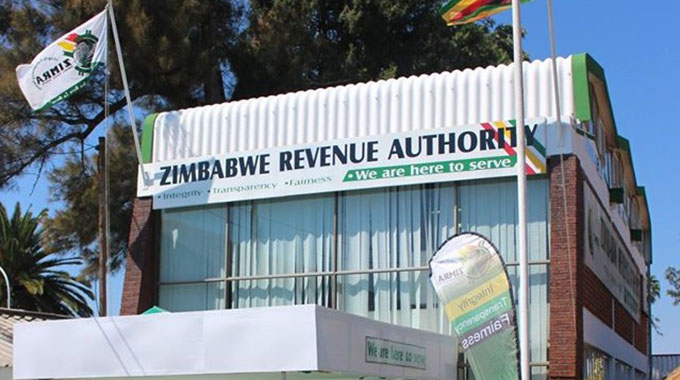
The Sunday Mail

Enacy Mapakame
Harare’s downtown businesses and other informal sector players have found a way of avoiding taxes by demanding cash transactions only, and strictly in US dollars, forcing customers to buy the greenback on the illegal parallel market at a premium.
In 2018, Finance and Economic Development Minister Professor Mthuli Ncube introduced the 2 percent tax on all electronic transactions to widen the tax base by tapping into the informal sector.
Investigations by The Sunday Mail Business indicate that some retailers and informal traders, particularly in downtown Harare, are dodging taxes through insisting on US dollar cash payments.
This means such transactions cannot be captured by the Zimbabwe Revenue Authority (ZIMRA), which has for years been angling to incorporate the informal sector.
Retailers of wares ranging from clothing, household goods, stationery, school uniforms, chemicals, toys and groceries have conveniently developed the habit of discouraging alternative forms of payment.
In most instances, they blame poor network connection to avoid mobile money or point-of-sale (POS) payments. They also do not offer receipts, while in the few instances they do, payments are reflected in local currency, even when the transaction was in US dollars.
This practice is also prevalent among fuel dealers, real estate agents, borehole drillers, medical doctors and contractors.
In his presentation at the ZIMRA fourth annual general meeting (AGM) held recently, Prof Ncube implored the tax authority to exhaust all revenue collection potential beyond set targets, while also leveraging on technology to plug leakages and eradicating corruption.
ZIMRA indicated to The Sunday Mail Business that the tax authority was aware of the malpractice by businesses and was pushing for enforcement of tax laws.
“ZIMRA has introduced toll-free hotlines for the public to report any unscrupulous businesses that are not issuing receipts in the currency of trade. Similarly, customers should ensure they are receipted or invoiced in the currency of payment. The public are encouraged to report to ZIMRA any cases of failure to issue receipts or invoices in the currency they tendered,” said ZIMRA head corporate communications Mr Francis Chimanda.
Tax offenders risk fines that could be as high as $10 000 per day as prescribed by Section 22A of Statutory Instrument 127.
Tax expert Mr Learnmore Nyamudzanga said it becomes illegal when retailers and other traders refuse other forms of payments and demand USD cash only.
“Not issuing invoices or issuing receipts in Zimbabwe dollars for a USD transaction does not affect the IMMT (2 percent tax), but it affects other tax heads; for instance, income tax, because the taxpayer is likely to understate sales. Citizens must also know that by allowing such illegal activities, they are reducing potential revenue to finance health, education, infrastructure, as about 92 to 98 percent of our national budget is financed by taxes, so every cent counts,” he said.
Arbitrage behaviour
The Confederation of Zimbabwe Retailers (CZR) president, Mr Denford Mutashu, said the behaviour by businesses was worrisome and efforts were being made to bring sanity in the sector.
He added such practices were influenced by suppliers of goods and services, as well as manufacturers demanding USD cash payments.
However, further investigations revealed the traders prefer cash transactions not only for tax avoidance, but to cushion themselves against currency volatility.
Some are cashing in on the exchange rate disparity between the official market and the parallel market.
On the official market rate, the USD is pegged at $88, while the parallel market rate is more than $155.
Captains of industry have expressed concern over the widening official and black market exchange rates, as well as delays in allocating foreign currency acquired on the auction.
Mr Nyamudzanga added: “The root problem here is the discrepancy between the official and parallel that is paving way for these profiteering schemes. There is need to correct the economic fundamentals to reduce the gap between official and parallel rate.”
Treasury, however, indicated US$70 million was released into the auction to clear the foreign currency backlogs and close the gap between parallel and official rates.
“We stand ready as Government to support the closure of that gap . . . and it will be closed,” Professor Ncube told our sister paper, The Chronicle, last week.
Incentives
Mr Nyamudzanga said while there was no one-size-fits-all solution across the region on enforcing tax compliance, especially in the informal sector, it was imperative for the Government to come up with policies that encourage formalising businesses and encourage tax compliance.
In 2020, 21 643 new businesses were registered by ZIMRA against a target of 35 000.
The problem, however, is not only with downtown traders, tuckshop operators and other small businesses but cuts across sectors. Some pharmacies, for instance, prefer USD cash transactions and accept mobile money or POS transactions at parallel market rates.
Other businesses still issue receipts in local currency for USD transactions. He said auditors issue voluntary disclosure letters to clients who are known that they supplied some big business with goods and services in foreign currency in order to give them a chance to voluntarily declare their sales.
Those who fail to disclose are usually prosecuted



